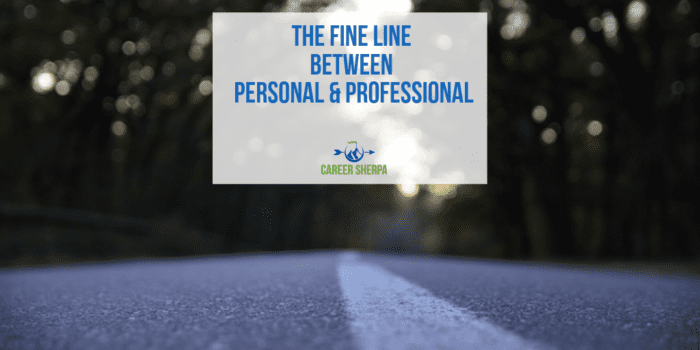It can be tricky to determine the fine line between personal and professional when it comes to building your personal brand. The line is fine but it’s also blurred.
You want to be likable, sincere, authentic, genuine, the real deal, but you don’t want to divulge too much personal “stuff.”
What’s too personal? What’s the right balance?
I am not sure there is a definite answer to this question. The lines between personal and professional are getting very blurry. This means, your message is interpreted differently by different audiences. One way to test your message is to get feedback from multiple people. It is also important to know something about the person you are speaking with.
Where’s The Line Between Personal and Professional
Do you ever research a person to find out what they do? What do you find? Is there enough information to make you feel like you know them?
Sometimes you discover their personal interests, where they volunteer, information in newspaper articles about their family and more. Out of curiosity, do you skim non-professional information? I bet you might.
Guess what, someone may have done the same basic research on you. What will they find? Is your online information too sterile or non-existent or is it overwhelming personal?
What’s Your Reputation?
Your online representation should have some personality. It should show the personal reputation you want to be known for.
In your job, people know you. They worked beside you and know your quirks as well as your strengths. Read Do You Have A Reputation?
Outside of your company, in the job market, strangers have no idea what you bring to the table, except what you tell them.
We stink at doing this well. It is tough work to describe who we are. It takes deep thinking and sometimes soul-searching.
Because this market is so competitive, so unlike any we’ve seen before, it is even more important than ever to make sure the right message is coming across, in-person and online.
And if you don’t take the time to show a blend of personal and professional, other people will. And if recruiters can’t figure out who you are and what your motivation is, why would they waste their time?
Start with LinkedIn
What do people see when they look at your profile? No picture? It is REALLY difficult to like someone without a face. I know, in the olden days (5 years ago) we weren’t supposed to use photos. Today, if your LinkedIn profile doesn’t have one, you are in the minority. Most LinkedIn profiles do have a picture. Upload yours today.
Does your LinkedIn summary read exactly like your resume?
Your resume is a formal marketing piece. Your LinkedIn profile is a PROFILE. There is a subtle difference. Many believe, and I am one of the many, that your LinkedIn summary should be a bit more personal than your resume. Why? Because it is being viewed online for a variety of reasons by a variety of people. You want everyone reading that to feel like they know you. So they will take that next step and call you/contact you/connect with you, for whatever reason that might be.
Here is more help to personalize your LinkedIn profile: Is Your LinkedIn Profile Awesome?
People want to do business with people they know, like and trust. People hire people. It is the interpersonal component- the likeability factor, that will set you apart.
If you are looking for more information on Personal Branding, check out the listing of Personal Branding resources I enjoy!
-
Personal Branding

Hannah Morgan speaks and writes about job search and career strategies. She founded CareerSherpa.net to educate professionals on how to maneuver through today’s job search process. Hannah was nominated as a LinkedIn Top Voice in Job Search and Careers and is a regular contributor to US News & World Report. She has been quoted by media outlets, including Forbes, USA Today, Money Magazine, Huffington Post, as well as many other publications. She is also author of The Infographic Resume and co-author of Social Networking for Business Success.

